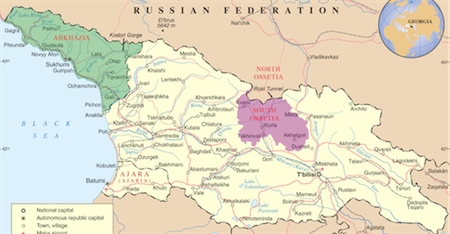
VIENNA — In August 2008, two wars unfolded in South Ossetia. Georgian newspapers and television stations reported an aggressive, unprovoked Russian invasion of their country. Russians, meanwhile, watched images and read tales of Georgian troops committing genocide.
For a brief period, Georgians could flip between TV stations to watch both versions. Soon, access to the Russian media ended. (Russians could not access Georgian TV and few Russians would be able to read Georgian print media.)
Margarita Akhvlediani, a longtime war correspondent and editor in chief of Go Group/Eyewitness Studio, studied the coordinated PR campaign by Georgia, the ensuing media coverage of the conflict by both Georgian and Russian media, and the role of NGOs in the information cycle. She presented some of her findings and related research at the Milton Wolf Seminar on the future of news and NGOs here in Vienna this morning. Her conclusion: International NGOs are critical to the dissemination of information in war and crisis zones.
Akhvlediani described a tale that came to symbolize the conflict for many Russians. According to the war story, dozens of Georgian villagers, seeking safety in a local church, died when Georgian soldiers burned the church to the ground. Human Rights Watch looked into the story, spending three months traveling to villages throughout the region looking for the church. Eventually, Human Rights Watch concluded: “…numerous Ossetian villagers interviewed by Human Rights Watch in [the] village said they never heard about, let alone witnessed, such an incident.”
Akhvlediani argues that this independent research serves as an important fact check on one-sided reporting happening by both sides of the conflict. Local NGOs, Akhvlediani explained, found themselves in a similar situation as local media — unwilling or unable to report a rounded look at the conflict, instead presenting a single point of view.
Western media, which parachuted in to cover the conflict, by and large provided a biased take, too, especially at the start of the conflict, according to fellow panelist Andrei Zolotov, editor-in-chief of Russia Profile (and a former Nieman Fellow). Many journalists seemed happy to latch onto the underdog narrative the Georgia government had pushed, he said. (Two dozen press releases went out in the first few days of the conflict, seeking to shore up Western support for Georgia). “It’s a very easy story to sell,” Zolotov said.
The work of Human Rights Watch, which took three months, is an unlikely project for any outlet, even the best-off newspapers. It’s an example of an ongoing theme we’ve covered this week: How can NGOs be newsmakers?